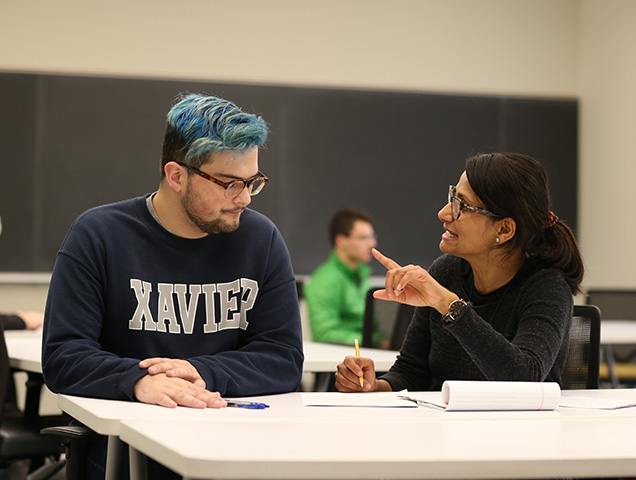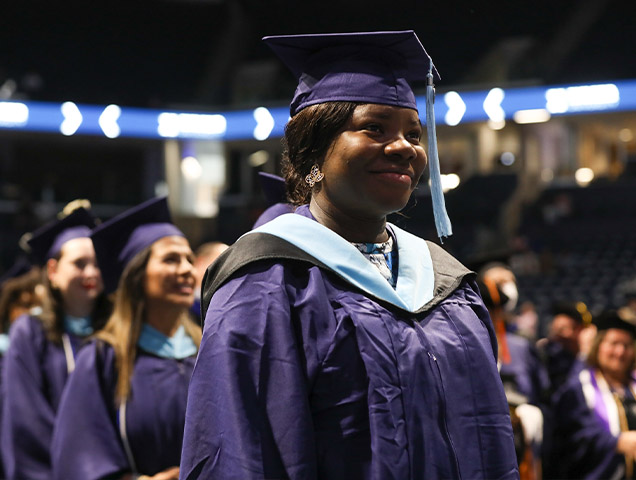Economics (BSBA)
Program Details
Economics is the study of how wealth, goods and services affect the world and its economies. As a student in the economics major in the Williams College of Business, you’ll learn the impact of economics on society and explore solutions that make economies more productive and sustainable. You’ll also be conducting original research during your senior capstone course, giving you the opportunity to apply what you’ve learned about economic theory and analysis to a topic of your choice.
Xavier University, located in Cincinnati, Ohio, is nationally recognized as a top university by U.S. News & World Report, The Princeton Review and Forbes. 99 percent of our students, including those in the economics major, are working, volunteering or in graduate school within six months of graduation (Class of 2022). Xavier University's Williams College of Business is accredited by the Association to Advance Collegiate Schools of Business (AACSB).
Degree Awarded
Bachelor of Science in Business Administration (BSBA) in Economics
Curriculum
The sample course sequence below illustrates class offerings for the Economics major. Consult the official Xavier University course catalog for detailed registration and advising information.
Fall
- CORE 100 First-Year Seminar............ 3cr.
- MATH 140 or 170: Calculus............ 3cr.
- ENGL 101: English Composition............ 3cr.
- Second Language Elective............ 3cr.
- MKTG 300: Principles of Marketing............ 3cr.
- CORE 101: GOA First Year Experience............ 0cr.
- BUAD 101: The Business Profession I............ 0cr.
Spring
- THEO 111: Theological Foundations............ 3cr.
- Historical Perspectives............ 3cr.
- Second Language Elective II............ 3cr.
- BAIS 220: Management of Business Technology............ 3cr.
- ECON 200: Microeconomics (Social Science)............ 3cr.
- BUAD 102: The Business Profession I............ 0cr.
- CORE 102: GOA First Year Experience 102............ 0cr.
Fall
- PHIL 100: Ethics as an Introduction to Philosophy............ 3cr.
- Creative Perspectives............ 3cr.
- BAIS 210: Quantitative Methods............ 3cr.
- ACCT 200: Introductory Financial Accounting............ 3cr.
- ECON 201: Macroeconomics............ 3cr.
- BUAD 201: The Business Profession II............ 0cr.
Spring
- Scientific Perspectives & Lab............ 3cr.
- ECON 300: International Trade & Business Environment............ 3cr.
- ACCT 201: Introductory Managerial Accounting............ 3cr.
- BAIS 211: Introduction to Business Analytics............ 3cr.
- MGMT 200: Organizational Management............ 3cr.
- BUAD 202: The Business Profession II............ 0cr.
Fall
- PHIL 200: Philosophical Perspectives............ 3cr.
- MGMT 201: Business & Professional Communication (OC/WRIT flags)............ 3cr.
- FINC 300: Business Finance (QR flag)............ 3cr.
- ECON 305: Microeconomic Analysis............ 3cr.
- ECON Elective............ 3cr.
- BUAD 301: The Business Profession III............ 0cr.
Spring
- Humanities Elective............ 3cr.
- ENGL 205: Literature & Moral Imagination............ 3cr.
- Theological Perspectives............ 3cr.
- ECON 306: Macroeconomic Analysis............ 3cr.
- ECON 307: Empirical Analysis in Economics............ 3cr.
- BUAD 302: The Business Profession III............ 0cr.
Fall
- Natural Science Elective and Lab............ 3cr.
- BLAW 300: Legal Environment (ERS/DCR flags)............ 3cr.
- ECON 494: Capstone Experience in Economics (fall or spring)............ 3cr.
- ECON Elective............ 3cr.
- ECON Elective............ 3cr.
- General Elective............ 3cr.
- BUAD 401: The Business Profession IV............ 0cr.
Spring
- MGMT 302: Quality & Productivity in Operations............ 3cr.
- ECON Elective............ 3cr.
- Business Core Capstone............ 3cr.
- Business Elective or Internship for Credit............ 3cr.
- General Elective............ 3cr.
- BUAD 402: The Business Profession IV............ 0cr.
- CORE 499: Reflection on the Core Curriculum............ 0cr.
Sample Courses
Xavier is known for providing an education that's both challenging and personal. Here are some courses that are part of the economics major at Xavier:
Microeconomic Principles (ECON 200) - Principles governing the efficient allocation of the nation's scarce resources. Economic behavior of consumers, producers and resource owners.
Macroeconomic Analysis (ECON 306) - Theoretical foundations of macro models integrating real and monetary sectors in both open and closed economies. Controversies in modern macro theory, with emphasis on business cycle theory.
Applied Research Method in Economics (ECON 480) - This course will provide an opportunity to learn about research design in applied microeconomics. Students will extend the theory they learn in their econometrics course to a wide variety of advanced empirical techniques that economists employ in the pursuit of the holy grail of research—the causal effect.
Capstone Experience in Economics (ECON 494) - The primary aim of the course is to use economic theory and data analysis to conduct an original research project. In this course, students will learn how to decide on an appropriate research topic, formulate hypotheses using economic theory, fit the topic into a broader literature, collect and analyze data and write the capstone itself.
Career Outcomes
99% of Xavier students, including those in the economics major, are working, volunteering or in graduate school within six months of graduating (Class of 2022).
Further Education: Law School, Ph.D in Public Policy related field, Ph.D in Economics
Top Jobs: Business Consulting, Market Analyst, Pricing Manager, Investment Banking, Financial Analyst, Campaign Manager, Operations Management, Account Executive
Student Job Placements: Macy’s, Kroger, Fifth Third Bank, US Bank, SC Johnson, 8451, Ernst & Young, Deloitte, Federal Reserve Bank
More: Xavier's Career Development Office assists students in their search for employment by offering individual career counseling sessions, conducting workshop series on interviewing and resume writing techniques and maintaining an educational, vocational and employer information resource center. More than 100 nationally known companies visit the campus annually to interview graduating seniors for positions in business and industry.
Student Clubs
Economics Association
Xavier students in the Economics Student Club learn about employment opportunities, take trips to area firms and host speakers while making a positive difference in the community. They also cultivate opportunities to meet and network with business leaders in Cincinnati, which can lead to employment opportunities.
Business Leaders for Tomorrow
Members of this student organization explore business processes firsthand by networking with and learning from various business leaders in Cincinnati and beyond. Events from past years have included trips to Silicon Valley and Chicago, job shadowing days and guest lecturers.
Mathematics Club
The purpose of the Xavier University Mathematics Club is to promote the interest of mathematics at Xavier University and to aid mathematics students or anyone with an interest in math to promote an interaction among math undergraduates, graduates, and faculty.
Women In Business (XWIB)
Preparing and empowering women to be tomorrow’s leaders through professional training, personal development workshops, mentoring and service.
When we seek something more, we become something greater.
Find more information about how you can become a Musketeer.
Request InformationCincinnati: A City of Opportunity for Economics Majors

Cincinnati, Ohio features some of the largest companies in the world, which means students in the economics major have countless opportunities for careers, internships and mentorships at places like Kroger, Procter & Gamble, Fifth Third Bancorp, American Financial and Western & Southern Financial group. The city is ranked the #1 Best City for College Graduates (smartasset.com) and the #15 Best Place to Start a Career (WalletHub).
What is Jesuit Education?

A Xavier education is more than your typical college experience. Drawing on a Jesuit Catholic educational model which emphasizes ethics, responsibility and service, students in the economics major get the support they need to succeed and make a difference in the world. The result is an education that’s as encouraging as it is challenging, and as enriching as it is demanding.
Continuing Education for Economics Majors

For students interested in pursuing a graduate degree, including a PhD, Xavier offers a guide to what is expected and required, including test and class recommendations.
Graduate With Honors
Are you looking for an academic challenge? The Smith Scholars Honors Program offers business students a more innovative, challenging curriculum in a cohort setting. This highly-selective program emphasizes experiential learning through funded global travel, work-study opportunities and close connections and support from professors and peers.

Economics Major at Xavier University
Economics is an academic major with a long and proud tradition at Xavier University. The BSBA in Economics is a four-year program that is a minimum 120-hour undergraduate degree. Economics majors analyze such topics as optimal decision-making, market efficiency, profit maximization, cost-benefit analysis, inflation, unemployment, international trade, financial markets, forces of globalization, and governmental economic activity. The program has proven useful to people who have moved into positions in many of the functional areas of business and government. It is also excellent training for graduate study in business, in law, and in economics itself. The department also offers a Bachelor of Arts in Economics degree through the College of Arts & Sciences.
Xavier University's Williams College of Business is accredited by the AACSB. AACSB-accredited schools offer students a relevant and challenging curriculum, the highest quality faculty and career opportunities that are not found at other business schools.
Xavier University is a private university located in Cincinnati, Ohio, providing a liberal arts education in the Jesuit Catholic tradition. Founded in 1831, the University is the sixth-oldest Catholic university in the nation. It has been ranked among the top 10 master's-level universities in the Midwest by U.S. News & World Report for the past two decades. The Princeton Review names it one of the "Best 385 Colleges in America."